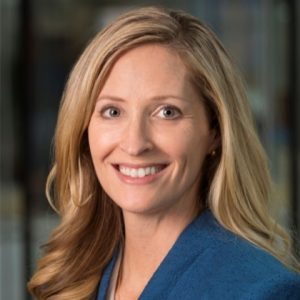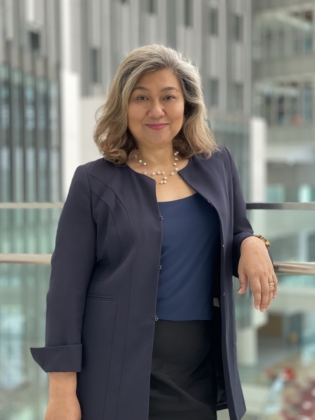“My advice to women starting their MBA journey is to first know that you are needed as thought leaders and decision-makers in all industries and across sectors.” In her ten years at the Yale School of Management, Kris Mercuri has had many conversations with women about imposter syndrome. “Imposter syndrome is real,” confirms the director of MBA admissions, recruiting and outreach.
“But we must recognize it as one of the things we can control. Forge ahead in your pursuit of a seat at the table, or at the head of the table. You will be joining a collective effort to get us all closer to equality.” Yale SOM had an early success in the formative years of the school of management back in the 1980s, when women comprised over 50% of the MBA class.
“Meaningful leadership means that all perspectives are represented and all viewpoints heard,” says Assistant Dean Bruce DelMonico, “and making sure that women have an equal seat at the leadership table is a critical component of this vision.”
Nearly Half the Top 100 MIM Programs are Composed of 50% Women Students

Since then, Yale SOM has been working to return to gender parity in the MBA program, which DelMonico sees as an important aspect of fully realizing this view of management education. Progress for the leading U.S. and international MBA programs has been slow.
It was not until 2018 that USC Marshall became the first top-ranked business school to achieve gender parity in an MBA program, while Wharton made the headlines in 2021 when the incoming MBA class was the first in the program’s 140-year history to be majority female.
The picture looks more balanced at the early career stage of graduate management education. Some 49 of the top 100 Masters in Management (MiM) programs in the Financial Times ranking recorded at least 50% women in 2022, including five of the top 10.
A Wide Range of Specialized Business Master’s are Now Available
Poets&Quants will be hosting the CentreCourt Masters Festival this week, and discussing with program directors and students the wide range of specialized Masters that are now available.
Certainly, businesses need more diverse perspectives and ideas to succeed in today’s complex and competitive global economy. But still, in 2023, a common reason why fewer women return to business school for an MBA or Executive MBA is the lack of flexibility that allows them to juggle both a family and their careers.
“Women everywhere carry the lion’s share of family care. Taking time off from work to care for young children would entail slower or interrupted career trajectories,” says Kristina Rai, chief operating officer at Asia School of Business, which offers a one-year MBA program in collaboration with MIT Sloan.
“All too often the clock stops for career progression when the biological parenting clock is ticking,” she adds. “This pause in a woman’s career often has an impact on seniority, job mobility, and even their confidence.”
Women and Career Breaks

Nalisha Patel, regional director for Europe at GMAC, echoes this point. “Taking time ‘out’ of their career may not be attractive for many women, and doing an executive program may just be too much.” As many women are already taking time out of their careers to have a family, it may not seem like it is an option to further their education as it involves another career break.
“The MBA remains largely a post-experiential degree,” says Bruce DelMonico at Yale SOM, “which can be less optimal timing for many women than comparable programs such as law degrees and other graduate programs.
To address this issue (among others), over 20 years ago we created a program called the Silver Scholars Program, which allows students to go directly from undergraduate to our MBA program here at Yale without any gap, which addresses this timing issue that many women face.”
There are a growing number of flexible options now available – different types of programs, varying course lengths and delivery formats available, online or hybrid study, part-time and stackable – this means that people can find something that suits their circumstances.
Flexible MBA Program Options Most Attractive to Women
“We learned from our GMAC Application Trends Survey that women’s representation in the applicant pool of flexible MBA programs, which allow students to switch between full-time and part-time status through their time in the program, is higher than any other U.S. MBA program type,” explains Patel.
This highlights that flexibility in graduate management education is key for women and something that more business schools need to prioritize if they want the gender balance of their cohorts to be more equal.
“We’re in the education sector, so we should be at the forefront of helping women traverse these dilemmas so that it does not become a binary choice of career or family,” says ASB’s Kristina Rai.
A Need for More Female Faculty and Staff

Another way business schools can attract more women is to have a more diverse staff and faculty. “For many reasons, business is perceived as a very male subject and often prospective students and their families do not see the whole spectrum of what business really is and the broad set of opportunities it offers,” says Malin Arve, vice rector for research at Norwegian School of Economics (NHH).
“A step towards changing this perspective would be to have more females on the faculty and offer female role models. It is important to lead the way by actively showing the important role that females or other underrepresented groups play in these programs,” says Arve.
She adds, “this can be done by having female role models in the educational institutions, but also drawing upon past and current female students to create awareness of their success and place in their field of expertise.”
‘Business Schools Need to Show They Walk the Talk’
As Rebecca Loades, director of MBA programs at ESMT Berlin insists, “Business Schools simply need to show they ‘walk the talk’ and employ female faculty and women at senior levels in the business schools.”
Business schools can also think of all the little things the institution can do to make an impact. Karen Spens, President of BI Norwegian Business School says “even if you start small, think big. It’s always better to do something than nothing, even small initiatives may have a big impact on someone.”
Marlin Arve emphasizes this point, “I do not think that there is one measure that alone can change the world. Changes come from the sum of all the small things that we do.”
There are many small changes that schools can make, and Nalisha Patel points to a range of options that include, “showcasing more females in their class profiles, adjusting their targeting when looking for applicants, partnering with bodies to support finance, supporting student-led clubs and events, offering more flexibility in programs, and providing places for mothers to breastfeed.”
Rebecca Loades adds that it is important to “recognize that business schools are not alone. Employers want to help their female employees develop so that they can reap the benefits of increased diversity at senior levels. Working together, business schools and employers can develop programs to support female career progression.”
Value in Starting the Journey, Regardless of Whether You Go to B-School

Even if you’re not 100% sure that business school is right for you, GMAC’s Nalisha Patel insists there are many benefits from even just applying. “It needn’t be challenging and you don’t have to commit to anything. You could find a whole host of benefits on the journey of exploring business schools – the connections, knowledge, and information about new careers and sectors.
But most of all, you’ll find confidence in the information out there encouraging you to do it, and you’ll find people that are rooting for you to succeed.” Rebecca Loades agrees. “Invest in yourself, know you can do it, and prepare for personal and professional transformation. And if you’re not sure now is the time, then consider joining women’s networks like the Forte Foundation, or the Professional Women’s Network. Reach out to women who inspire you, learn from them.”
Yale SOM is a founding member of the Forte Foundation and has partnered with organizations such as 21 Broads and Womensphere over the years to encourage more women to pursue graduate management education. The school also engages in recruiting efforts at Seven Sisters schools and other academic institutions, partnering with colleagues at Harvard, Wharton, and elsewhere, to increase awareness among aspiring MBA students.
Bruce DelMonico hopes these efforts and continued experiments with program portfolio and educational delivery innovation will provide inspiration and meaningful flexibility for women who may not otherwise have considered graduate management education to pursue an MBA degree.
“The industry continues to move toward gender parity in the MBA student body, and I feel that it remains a matter of when rather than if. Some schools have crossed that threshold intermittently, and I think more schools will do that in the coming years, and on a more consistent basis.”
Originally published by Poets&Quants.





